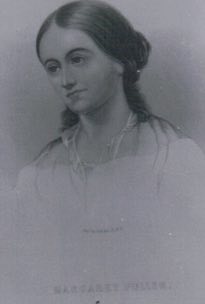Margaret Fuller, whose thoughts and writings inspired leaders of the women’s movement, was a literary critic, free thinker, Transcendentalist leader, editor, teacher and women’s rights author.
Fuller, well-educated and driven by boundless intellectual curiosity, was captivated by the Transcendentalist movement in New England, and became a colleague of Emerson, Bronson Alcott and other movement leaders while she taught. She became the editor of The Dial, the Transcendental journal, and advocated the philosophy of liberation and fulfillment of the highest potential of all human beings — including women.
From 1839 to 1844 she held her series of “Conversations” for women in Boston, encouraging women to think and talk together about ideas. These dialogues led Fuller to write her most important work, Women in the Nineteenth Century (1845), considered a classic work of American feminist thought that had a profound influence on the Seneca Falls Women’s Rights gathering in 1848. The book’s message was that women must fulfill themselves as individuals, not subordinates to men. She wrote, “We would have every arbitrary barrier thrown down. We would have every path laid open to woman as freely as to man….then and then only will mankind be ripe for this, when inward and outward freedom for woman as much as for man shall be acknowledged as a right, not yielded as a concession.”
Fuller was recruited by publisher Horace Greeley in 1844 to become the literary critic for his New York Tribune, and in 1846-47 she traveled as a foreign correspondent in Europe, where she became friends with Thomas Carlyle, Giuseppe Mazzini, George Sand and many other intellectual and political leaders.
She fell in love with an Italian revolutionary and was caught up in that nation’s political situation, not sailing for home with her husband and son until 1850. She and her family drowned off Fire Island in the wreck of the ship returning her to America.
Throughout her life, Margaret Fuller pursued both knowledge and experience with boundless energy and a brilliant mind, having a strong influence on generations of women to come and fulfilling her own statement that “Very early, I knew that the only object in life was to grow.”

